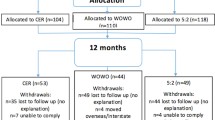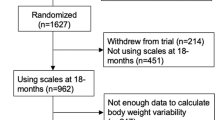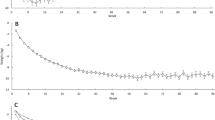Abstract
Objective:
The purpose of this study was to investigate whether pre-treatment subject characteristics and weight change during the first weeks of a low-calorie diet (LCD) can predict weight loss outcomes at the end of a controlled 8-week weight loss period in overweight and obese adults.
Subjects:
A total of 932 overweight and obese subjects of both genders were included at eight European centers, and underwent an 8-week LCD period.
Results:
The weight loss at week 8 was positively correlated with initial body weight (Spearman's ρ=0.62), height (ρ=0.43), body mass index (ρ=0.43), waist (ρ=0.48) and hip circumference (ρ=0.33), sagittal diameter (ρ=0.45), fat mass (ρ=0.35) and fat-free mass (ρ=0.52), and gender (ρ=−0.36) (all P<0.01). In the multivariate regression model, adjusted for center, only initial body weight, early weight loss (week 1) and weight loss at week 3 were significant predictors of weight loss outcome at week 8: weight loss (kg) at week 8=0.09+0.046 × baseline body weight (kg)−0.311 × weight loss (kg) at week 1+1.284 × weight loss (kg) at week 3 (R2=68%, P<0.0001). A weight loss of ⩾2.6 kg at week 1 during the LCD period was identified as the optimal cut-off predictor for at least 10 kg weight loss at week 8.
Conclusions:
This study suggests that initial body weight, early weight loss (week 1) and weight loss at week 3 are predictors of final weight loss during an 8-week LCD, and may be used as early biomarkers of subsequent responses to an LCD diet.
This is a preview of subscription content, access via your institution
Access options
Subscribe to this journal
Receive 12 print issues and online access
$259.00 per year
only $21.58 per issue
Buy this article
- Purchase on Springer Link
- Instant access to full article PDF
Prices may be subject to local taxes which are calculated during checkout
Similar content being viewed by others
References
Anderson JW, Grant L, Gotthelf L, Stifler LT (2007). Weight loss and long-term follow-up of severely obese individuals treated with an intense behavioral program. Int J Obes (Lond) 31, 488–493.
Astrup A, Buemann B, Gluud C, Bennett P, Tjur T, Christensen N (1995). Prognostic markers for diet-induced weight loss in obese women. Int J Obes Relat Metab Disord 19, 275–278.
Dhurandhar NV, Blank RC, Schumacher D, Atkinson RL (1999). Initial weight loss as a predictor of response to obesity drugs. Int J Obes Relat Metab Disord 23, 1333–1336.
Dubbert PM, Wilson GT (1984). Goal-setting and spouse involvement in the treatment of obesity. Behav Res Ther 22, 227–242.
Dye L, Blundell JE (1997). Menstrual cycle and appetite control: implications for weight regulation. Hum Reprod 12, 1142–1151.
Fabricatore AN, Wadden TA, Moore RH, Butryn ML, Heymsfield SB, Nguyen AM (2009). Predictors of attrition and weight loss success: results from a randomized controlled trial. Behav Res Ther 47, 685–691.
Finer N, Ryan DH, Renz CL, Hewkin AC (2006). Prediction of response to sibutramine therapy in obese non-diabetic and diabetic patients. Diabetes Obes Metab 8, 206–213.
Hainer V, Kunesova M, Bellisle F, Hill M, Braunerova R, Wagenknecht M (2005). Psychobehavioral and nutritional predictors of weight loss in obese women treated with sibutramine. Int J Obes (Lond) 29, 208–216.
Hansen D, Astrup A, Toubro S, Finer N, Kopelman P, Hilsted J et al. (2001). Predictors of weight loss and maintenance during 2 years of treatment by sibutramine in obesity. Results from the European multi-centre STORM trial. Sibutramine Trial of Obesity Reduction and Maintenance. Int J Obes Relat Metab Disord 25, 496–501.
Hollis JF, Gullion CM, Stevens VJ, Brantley PJ, Appel LJ, Ard JD et al. (2008). Weight loss during the intensive intervention phase of the weight-loss maintenance trial. Am J Prev Med 35, 118–126.
Larsen TM, Dalskov S, van Baak M, Jebb S, Kafatos A, Pfeiffer A et al. (2009). The Diet, Obesity and Genes (Diogenes) Dietary Study in eight European countries—a comprehensive design for long-term intervention. Obes Rev 11, 76–91.
Leibbrand R, Fichter MM (2002). Maintenance of weight loss after obesity treatment: is continuous support necessary? Behav Res Ther 40, 1275–1289.
Moore CS, Lindroos AK, Kreutzer M, Larsen TM, Astrup A, van Baak MA et al. (2009). Dietary strategy to manipulate ad libitum macronutrient intake, and glycaemic index, across eight European countries in the Diogenes Study. Obes Rev 11, 67–75.
Mutch DM, Temanni MR, Henegar C, Combes F, Pelloux V, Holst C et al. (2007). Adipose gene expression prior to weight loss can differentiate and weakly predict dietary responders. PLoS One 2, e1344.
Rössner S (1992). Factors determining the long-term outcome of obesity treatment. In: Björntorp P, Brodoff B (eds). Obesity. Lippincott Co: Philadelphia.
Sartorio A, Maffiuletti NA, Agosti F, Lafortuna CL (2005). Gender-related changes in body composition, muscle strength and power output after a short-term multidisciplinary weight loss intervention in morbid obesity. J Endocrinol Invest 28, 494–501.
Teixeira PJ, Going SB, Houtkooper LB, Cussler EC, Metcalfe LL, Blew RM et al. (2004). Pretreatment predictors of attrition and successful weight management in women. Int J Obes Relat Metab Disord 28, 1124–1133.
Wadden TA, Stunkard AJ (1986). Controlled trial of very low calorie diet, behavior therapy, and their combination in the treatment of obesity. J Consult Clin Psychol 54, 482–488.
Wadden TA, Foster GD, Wang J, Pierson RN, Yang MU, Moreland K et al. (1992). Clinical correlates of short- and long-term weight loss. Am J Clin Nutr 56, 271S–274S.
Webster JD, Garrow JS (1989). Weight loss in 108 obese women on a diet supplying 800 kcal/d for 21 d. Am J Clin Nutr 50, 41–45.
Westerterp-Plantenga MS, Kempen KP, Saris WH (1998). Determinants of weight maintenance in women after diet-induced weight reduction. Int J Obes Relat Metab Disord 22, 1–6.
Acknowledgements
We thank the project staff and all the contributors to the project. DiOGenes is the acronym of the project ‘Diet, Obesity and Genes’ supported by the European Community (Contract no. FOOD-CT-2005–513946), http://www.diogenes-eu.org.
Author information
Authors and Affiliations
Corresponding author
Ethics declarations
Competing interests
The authors declare no conflict of interest.
Additional information
This study has not been previously presented or published.
Rights and permissions
About this article
Cite this article
Handjieva-Darlenska, T., Handjiev, S., Larsen, T. et al. Initial weight loss on an 800-kcal diet as a predictor of weight loss success after 8 weeks: the Diogenes study. Eur J Clin Nutr 64, 994–999 (2010). https://doi.org/10.1038/ejcn.2010.110
Received:
Revised:
Accepted:
Published:
Issue Date:
DOI: https://doi.org/10.1038/ejcn.2010.110
Keywords
This article is cited by
-
Behavioral and Psychological Factors Affecting Weight Loss Success
Current Obesity Reports (2023)
-
Dietary protein and the glycemic index handle insulin resistance within a nutritional program for avoiding weight regain after energy-restricted induced weight loss
Nutrition & Metabolism (2022)
-
Predictors of weight loss in obese patients with obstructive sleep apnea
Sleep and Breathing (2022)
-
A Phenotypic Approach for Personalised Management of Obstructive Sleep Apnoea
Current Otorhinolaryngology Reports (2021)
-
Review of Advances in Anti-obesity Pharmacotherapy: Implications for a Multimodal Treatment Approach with Metabolic Surgery
Obesity Surgery (2019)



